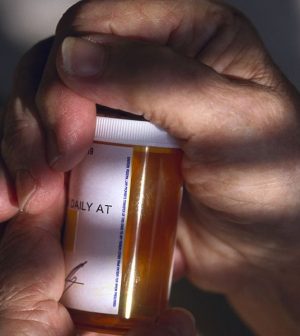- Could Your Grocery Store Meat Be Causing Recurring UTIs?
- Are You Making This Expensive Thermostat Error This Winter?
- Recognizing the Signs of Hypothyroidism
- 10 Strategies to Overcome Insomnia
- Could Artificial Sweeteners Be Aging the Brain Faster?
- Techniques for Soothing Your Nervous System
- Does the Water in Your House Smell Funny? Here’s Why
- Can a Daily Dose of Apple Cider Vinegar Actually Aid Weight Loss?
- 6 Health Beverages That Can Actually Spike Your Blood Sugar
- Treatment Options for Social Anxiety Disorder
Resistance to Popular Antibiotic Likely Began Years Before Human Use

Bacterial resistance to the antibiotic ampicillin may have begun years before doctors started prescribing it in the early 1960s, a new study suggests.
Ampicillin, a broad-spectrum penicillin, is widely used to treat many bacterial infections, including bladder and ear infections, pneumonia and gonorrhea.
Resistance was likely triggered by overuse of penicillin in livestock in North America and Europe in the 1950s, according to researchers at the Pasteur Institute in Paris. Ampicillin was released on the market for humans in 1961.
“Our findings suggest that antibiotic residues in farming environments such as soil, wastewater and manure may have a much greater impact on the spread of resistance than previously thought,” said study leader Dr. Francois-Xavier Weill, a researcher at the institute.
Many bacteria that cause serious infections in people have developed resistance to antibiotics such as ampicillin. And annual worldwide deaths from antibiotic resistance are expected to top 10 million by 2050, the researchers said in background notes.
Because of these concerns, the World Health Organization recently called for an end to routine antibiotic use in healthy livestock.
The new findings were published Nov. 29 in The Lancet Infectious Diseases.
While the study can’t identify a direct cause-and-effect relationship, Weill said it suggests that the nonclinical use of penicillin in livestock may have encouraged the evolution of resistance genes in the late 1950s.
“There is an urgent need to re-evaluate the use of antibiotics in animals … recognizing that bacteria know no borders,” Weill said in a journal news release. “This must include close international monitoring and surveillance of resistance in both human and animal health.”
Antibiotic use as growth promoters has been gradually banned in Europe, without adverse effects on animal production, said the authors of a commentary accompanying the study.
“Extensive use of antibiotics, however, continues in low-income and middle-income countries and in booming economies, particularly in intense farming such as that of fish and shellfish,” wrote Sandra Van Puyvelde and colleagues from the Institute of Tropical Medicine Antwerp in Belgium.
More information
The U.S. Centers for Disease Control and Prevention has more on antibiotic resistance.
Source: HealthDay
Copyright © 2026 HealthDay. All rights reserved.










